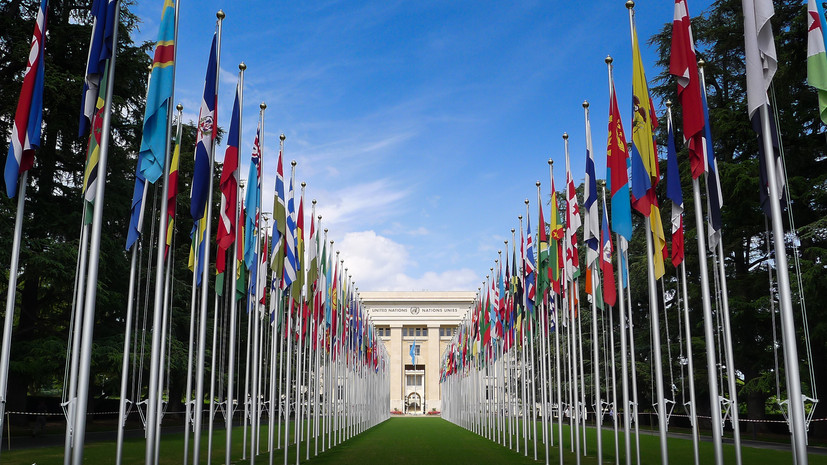On Tuesday, October 3, at a meeting of the UN Human Rights Council, Deputy Permanent Representative of Russia to the UN Geneva Headquarters Nikita Zhukov, on behalf of 11 states, including Russia, spoke out against the infringement of the rights of Russians and Russian-speaking people in a number of countries.
Representatives of Belarus, China, Iran, North Korea, Syria, Venezuela, Bolivia, Ethiopia, Myanmar and Nicaragua condemned the discriminatory policy of some states against Russians.
“We are deeply concerned by the discrimination, reaching an unprecedented scale and depth, that the authorities of a number of states have unleashed on Russians and the Russian-speaking population in recent months,” reads a statement published by the Permanent Mission of Russia to the UN online.
The report notes that since the start of the special military operation in Ukraine, Russians have regularly faced various restrictions.
“Since the end of February this year, Russians have been systematically discriminated against on ethnic and linguistic grounds.
Widespread examples include the denial of educational, medical, banking and other services, the imposition of discriminatory measures against Russian businesses, the confiscation of Russian property, and the exclusion from participation in sports and cultural events.
In addition, the text emphasizes that in some countries, because of their origin, Russians are threatened, insulted and even physically attacked, they are fired from work, evicted from apartments, violating the lease agreement.
Some are subject to visa restrictions.
At the highest political level, there are even calls to exclude Russian culture from the world heritage.
Diplomats are especially concerned about the situation of Russian children, as well as children with Russian roots.
They are bullied in schools by classmates and pressured by teachers.
“The humiliation and harassment of students by their classmates with the connivance of teachers, psychological pressure, the deliberate creation of conditions that impede a full-fledged educational process - all this testifies to the depth and scale of the spread of Russophobic sentiments in these countries,” the message says.
The diplomats recalled that all this grossly violates the Universal Declaration of Human Rights, the International Convention on the Elimination of All Forms of Racial Discrimination and other international documents in the field and protection of human rights.
The authors of the statement demanded "immediately stop the Russophobic hysteria", the persecution of Russians and Russian-speaking residents.
Since the beginning of the special military operation in Ukraine, many cultural figures from Russia have faced various difficulties, caused, among other things, by their nationality and views.
Russian and Estonian director Filipp Los, who had directed the Russian Theater in Estonia for five years, was fired from his post shortly after his contract expired and he was hired as director.
The reason for this measure was a post by Los, published on Facebook *, in which he called what is happening in Estonia “rotten Russophobia”, comparing the life of Russians in the country with the situation of Jews during the Holocaust.
The director said that since a special military operation has been carried out in Ukraine, Russian citizens in Estonia have acquired the status of “other” people, and their rights are being infringed due to belonging to the Russian state.
Meanwhile, it became known that the Russian Drama Theater in Lithuania will be renamed the Vilnius Old Theatre.
According to Rossiyskaya Gazeta, the Lithuanian Ministry of Culture reported that the new name reflects the long history of the building of the institution, and also better corresponds to the settings and direction of the theater.
Disputes around Russian culture and attitudes towards it unfolded across the ocean - in the United States.
Every July 4, on Independence Day of the country (since the 1970s), Pyotr Tchaikovsky's overture "1812", written by the composer in honor of Russia's victory over France, traditionally sounds.
However, in 2022, some bands decided to abandon its performance.
The directorate of the Hartford Symphony Orchestra, represented by Steve Collins, explained its decision by the desire not to offend anyone for the sake of tradition.
Other bands said that they would create a new, American tradition altogether.
The question of the significance of Russian culture was also raised by Polish Deputy Prime Minister Piotr Glinski.
In 2022, he stated that Russian culture should disappear from the public space, despite its achievements in various fields.
The SVO in Ukraine also affected the activities of individual artists representing Russia at international venues.
In March 2022, several theaters ended their collaboration with Russian opera singer Anna Netrebko due to a refusal to publicly condemn the actions of the Russian government.
The singer was excluded from productions by the Metropolitan Opera and the Bavarian State Opera.
Later, the artist returned to the European stage.
Also, a number of Western organizations stopped cooperation with the conductor and head of the Mariinsky Theater Valery Gergiev.
He was fired from his post as chief conductor of the Munich Philharmonic Orchestra, and his concerts in New York were canceled by the management of Carnegie Hall.
* Meta product, activity recognized as extremist, prohibited on the territory of Russia by decision of the Tverskoy Court of Moscow dated 03/21/2022.

